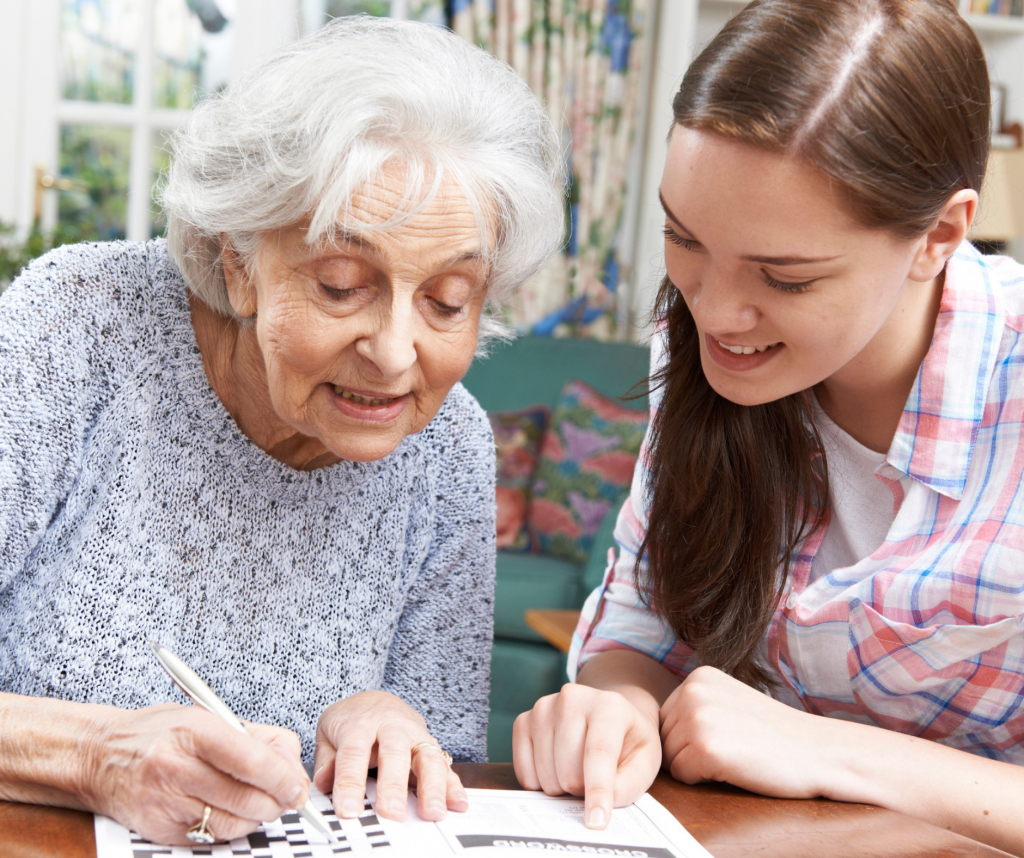
As you probably know, a hobby is defined as “an activity or interest pursued for pleasure or relaxation.” But what you may not realize is that hobbies have an extra benefit beyond pleasure and relaxation – they’re good for you!
Having a hobby is good for you at any age, but for seniors, they provide a fun and easy way to maintain and even improve health. In this post, we’ll outline several benefits of hobbies and how to help your senior parent or loved one take advantage of them.
The benefits of hobbies
Having any hobby can be beneficial, but there are certain types of hobbies that have an extra impact. Overall, pursuing anything you enjoy is good for your brain health because they include mental activity. According to Psychology Today, “Compelling research indicates that mental activity is all good for the brain. Some studies have looked at specific activities—such as playing a musical instrument, doing crossword puzzles, or playing games—and have found that people who engage in these hobbies tend to have better memory and executive functioning skills and a reduced risk of dementia.”
Hobbies also help your health in other ways. A study in 2010 showed that hobbies and leisure pursuits were associated with markers of better physical health like lower blood pressure, lower body mass index, and lower levels of stress hormones. Another study published in March 2020 showed that hobbies are linked with decreased symptoms of depression and 30% lower odds of experiencing depression. Doing something you love also reduces your stress and having high stress levels can be dangerous to your health. Check out this recent blog post about the impact of stress to learn more.
Want to get even more bang for your buck with a hobby? Choose one that involves physical activity or socialization with others. Or even better, both of those things! Both exercise and socialization have their own health benefits, so pursuing a hobby that involves those two elements can be even more powerful.
Ways to help your loved one pursue their interests
Just like any lifestyle modification, it can take some planning and effort to properly implement it. When it comes to hobbies, there are a few things you can do to stay mindful and make sure your loved one can take full advantage of the health benefits:
- Prioritize it/make it a habit – Hobbies can sometimes feel frivolous and not a necessity when you’re dealing with bigger issues like medical conditions. But in reality, hobbies should have a place in everyone’s life for the reasons listed above and more.
As you age, you often have to make lifestyle changes in order to maintain your health, and they’re not always pleasant. But pursuing hobbies is a lifestyle change that most people can get on board with. It’s definitely easier (and more fun) than giving up your favorite foods! Make it a priority and schedule the time it takes to help your parent do the things they love. It will pay off in the long run.
- Join them – As we discussed above, having a hobby that involves another person has added bonuses. And doing something fun with your parent or loved one can be a welcome break from some of the more tedious tasks you may have to perform as their family caregiver.
- Help them with online options – There are some great advantages to the internet age, and one of them is learning and connecting with others from the comfort of your own home. Your loved one can take an online class or join a group with others who have similar interests (check Facebook for tons of these groups!). Having this as an option can be really helpful for those times when they may not be able to leave their home for whatever reason.
- Capitalize on what they already enjoy – While you CAN “teach an old dog new tricks” and anyone can start a hobby at any age, it’s easier to go with what they already know. Most seniors pursued hobbies and interests at some point, but they may have given them up.
Now more than ever, it’s easier to pick up on old hobbies and connect with others who share similar interests – it just may look a little different than when they were younger! Also know that you can start simple. A book club, playing bridge or other games with friends, or doing arts and crafts at home can work just fine.
- Get a caregiver – Life can get busy, and you may not have as much time as you would like to help your parent or loved one with their hobbies. That’s when it can be beneficial to bring in help from a caregiver. We work hard to match up our caregivers with clients who have similar interests, which helps them better connect and makes it easier to pursue their hobbies. Our caregiver Ellen likes to swim and takes her client (a lifelong swimmer) to the pool every week. Cindy loves arts and crafts and does them with her client during shifts.
Conclusion:
It may be a simple thing but pursuing hobbies and interests can be hugely beneficial to health. But hobbies can often take a backseat as other issues become more urgent, so it can take some effort to help your loved one with it. This can especially be true if you also have a family of your own to care for.
If you’d like to learn more about how a caregiver can help your loved one with your hobbies and more, check out our service pages. And when you’re ready, book a complimentary discovery call to talk with a client service specialist.